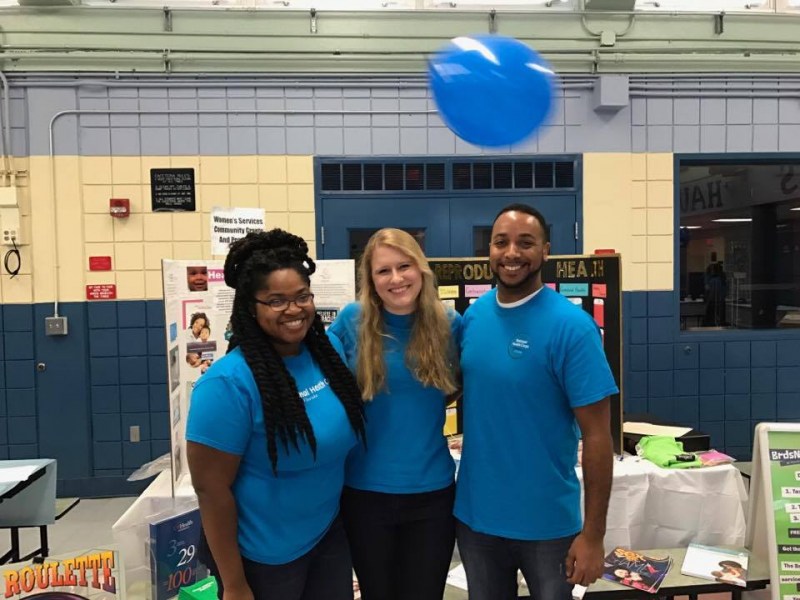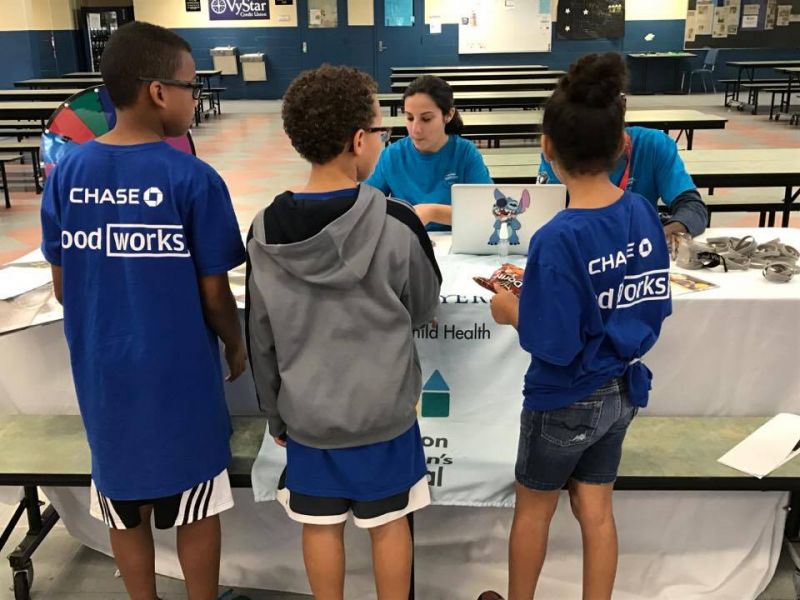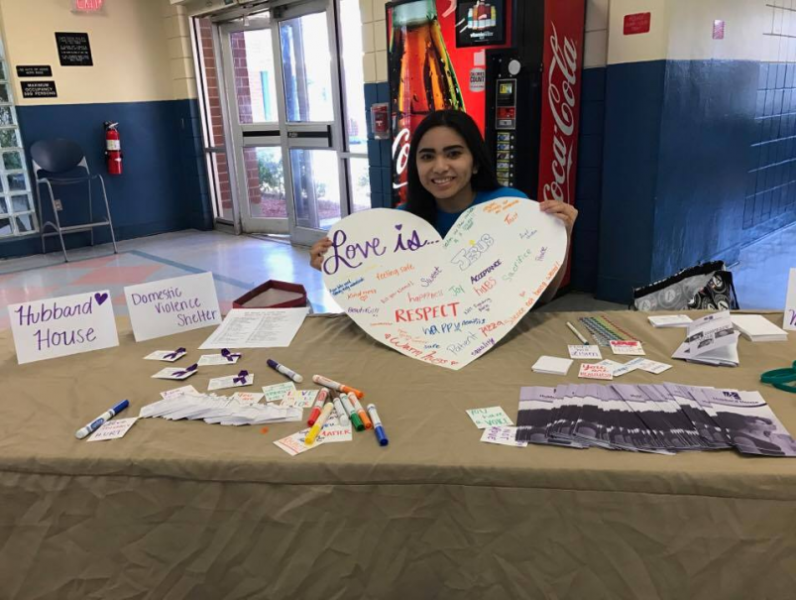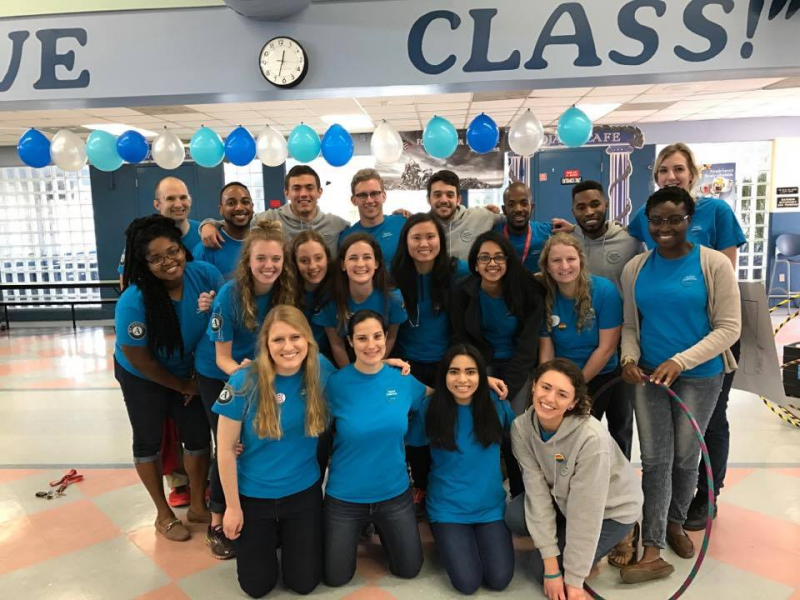Serving in MLK's Legacy
 Many people wake up in the morning feeling rested, refreshed, and ready to tackle the day. They begin their mornings with a balanced breakfast and perhaps even some exercise before getting dressed and making warm farewells to their loved ones at home. They move about their day at their stable job, fairly confident and secure, experiencing positive interactions along the way. With some variations and the occasional “bad day”, this picture summarizes the lives of many Americans who have not experienced the social barriers that inhibit many others from achieving that quality of life.
Many people wake up in the morning feeling rested, refreshed, and ready to tackle the day. They begin their mornings with a balanced breakfast and perhaps even some exercise before getting dressed and making warm farewells to their loved ones at home. They move about their day at their stable job, fairly confident and secure, experiencing positive interactions along the way. With some variations and the occasional “bad day”, this picture summarizes the lives of many Americans who have not experienced the social barriers that inhibit many others from achieving that quality of life.
This idealistic picture is the result of opportunity, access, and privilege. They wake up rested because they live in a safe neighborhood where they fall asleep without worry. They have been taught that breakfast is the most important meal of the day, and they can afford fresh, healthy foods. They have a gym membership and a car, so working out in the morning is easy and fun. They make kind exchanges with those who live and work with them because they have healthy, supportive relationships. They see their doctor regularly because they have health insurance and can access care. They are successful because their well-written resume helped them get a good job, and they have a group of friends who support them in their identity.
 The opportunities within this picture, however, are not equal for everyone in our country. Whether income barriers, unhealthy relationships, or an overall lack of educational, social, or emotional support, many Americans go without the necessary tools to pursue the same quality of life. When Martin Luther King Jr. stated that he “[had] the audacity to believe that peoples everywhere can have three meals a day for their bodies, education and culture of their minds, and dignity, equality, and freedom for their spirits,” he was describing the world we as a National Health Corps envision, but sadly does not exist as of yet. But we too have the “audacity” to believe that this justice is possible.
The opportunities within this picture, however, are not equal for everyone in our country. Whether income barriers, unhealthy relationships, or an overall lack of educational, social, or emotional support, many Americans go without the necessary tools to pursue the same quality of life. When Martin Luther King Jr. stated that he “[had] the audacity to believe that peoples everywhere can have three meals a day for their bodies, education and culture of their minds, and dignity, equality, and freedom for their spirits,” he was describing the world we as a National Health Corps envision, but sadly does not exist as of yet. But we too have the “audacity” to believe that this justice is possible.
Within the National Health Corps-Florida AmeriCorps program, we have the opportunity to serve organizations in Jacksonville that strive to alleviate barriers to healthcare within our community. The Hubbard House supports and empowers victims of domestic abuse; the YMCA instills proper nutrition and exercise habits into children at a young age; JASMYN promotes equality and human rights by creating a safe space and services for LGBTQ youth; Sulzbacher offers shelter, medical and dental care as well as life skills support; Barnabas provides quality medical care to uninsured patients; Healthy Start aims to reduce infant mortality which disproportionately impacts non-white mothers. The NHC partners with each of these organizations and others in order to foster healthier communities in Jacksonville.
 The efforts of these organizations came to one culminating day of collaboration on Martin Luther King Jr. Day this year when NHC members gathered for a health fair at Ribault High School in Jacksonville, representing their various host sites, informing the population of different health services in Northeast Florida. Considering the words of MLK himself, who stated that "life's most persistent and urgent question is: 'What are you doing for others?'", NHC members spent the day of service striving to live up to these words. In accordance with the purpose of the day, we asked several members what MLK Day meant through the lens of their own host site.
The efforts of these organizations came to one culminating day of collaboration on Martin Luther King Jr. Day this year when NHC members gathered for a health fair at Ribault High School in Jacksonville, representing their various host sites, informing the population of different health services in Northeast Florida. Considering the words of MLK himself, who stated that "life's most persistent and urgent question is: 'What are you doing for others?'", NHC members spent the day of service striving to live up to these words. In accordance with the purpose of the day, we asked several members what MLK Day meant through the lens of their own host site.
Rachel Marren, who made buttons with participants where they could proudly express causes in which they believe and who educated community members about their services expressed her thoughts on the day. “Almost everything that JASMYN does relates to racial justice,” she said. “One clear example is our efforts to prevent HIV transmission and ensure that people living with HIV can access the care that they need. If current infection rates persist, the CDC predicts that 1 in 2 Black men and trans women who have sex with men (MSM) in the U.S. will be diagnosed with HIV in their lifetime. This rate is 1 in 11 for white MSM, and 1 in 99 for the general U.S. population. This clear health disparity reflects intersecting racism, homophobia, and transphobia that many JASMYN youth encounter on a daily basis. I see MLK Day as both a celebration of the strides that activists have made and also as a reminder of how much work remains in dismantling systemic oppression.”
 Cecilia Rosopa who spoke with people about healthy relationships and services at the Hubbard House commented: “Hubbard House’s motto is ‘Every Relationship Violence Free’. We strive every day to end Domestic Violence. We base our healing process on the foundation of empowerment and feminism. We help our clients find their voice. Martin Luther King Jr. dedicated his life to promoting peace and racial equality for all. In the field of Domestic Violence Awareness, we see racial inequality very clearly through our victims and survivors. Of the 1.3 million women who report experiencing Domestic Violence or Interpersonal Violence, African American women are 3 times more likely to experience death as a result than their white counterpart. Martin Luther King Jr.’s legacy is the face of equality, non-violence, and peace. These are all aspects that we at the Hubbard House are also so passionate about implementing in our community. MLK day is a holiday which helps honor the work done before us and for us to celebrate the dedication we also have for this cause.”
Cecilia Rosopa who spoke with people about healthy relationships and services at the Hubbard House commented: “Hubbard House’s motto is ‘Every Relationship Violence Free’. We strive every day to end Domestic Violence. We base our healing process on the foundation of empowerment and feminism. We help our clients find their voice. Martin Luther King Jr. dedicated his life to promoting peace and racial equality for all. In the field of Domestic Violence Awareness, we see racial inequality very clearly through our victims and survivors. Of the 1.3 million women who report experiencing Domestic Violence or Interpersonal Violence, African American women are 3 times more likely to experience death as a result than their white counterpart. Martin Luther King Jr.’s legacy is the face of equality, non-violence, and peace. These are all aspects that we at the Hubbard House are also so passionate about implementing in our community. MLK day is a holiday which helps honor the work done before us and for us to celebrate the dedication we also have for this cause.”
Michael Hodges, who led participants in exercise games, said, “The YMCA consists of three pillars with healthy living being the most well known of the three. One of the less known pillars however is social responsibility. At The Y, it has long been a goal to provide everyone in the community an equal opportunity for health enrichment in their lives no matter their race, religion, or even financial status. MLK Day at The Y serves as a time each year to recommit and refocus on its goal in providing the equality in the community that Martin Luther King Jr. so desperately fought for.”
 Erika Ferreira, who served at our “self-care” station, stated: “We honor Martin Luther King Jr., a prominent political figure who valued serving others, with a day of service. Clay Behavioral Health Center's mission and vision are founded on the principle of providing health services towards individuals and families for the sake of building a healthier community. At this time of heightened political tension, it is distressing to see this divide in our nation and the difficulty in finding compromise through our healthcare system. However, it is reaffirming to witness the many people dedicated towards improving the health of the underserved in Clay County and actively working towards reducing the stigma of mental illness. I am grateful to be serving alongside an organization that, as the CEO has stated, consists of ‘a diverse group of people serving diverse groups of people.’”
Erika Ferreira, who served at our “self-care” station, stated: “We honor Martin Luther King Jr., a prominent political figure who valued serving others, with a day of service. Clay Behavioral Health Center's mission and vision are founded on the principle of providing health services towards individuals and families for the sake of building a healthier community. At this time of heightened political tension, it is distressing to see this divide in our nation and the difficulty in finding compromise through our healthcare system. However, it is reaffirming to witness the many people dedicated towards improving the health of the underserved in Clay County and actively working towards reducing the stigma of mental illness. I am grateful to be serving alongside an organization that, as the CEO has stated, consists of ‘a diverse group of people serving diverse groups of people.’”
Maria Tran, who took vital signs for health fair attendees, stated that in her role at Barnabas, “we provide primary care to those who do not have health insurance. In honor of MLK Day, I am glad that we could educate the community regardless of social or socioeconomic status on crucial vital signs and what it means for their health. It is important to educate patients on the importance of vital signs and what they can tell medical providers about their patients. It is also important that the patient is aware of what their own vitals mean. Quality medical care should not be a luxury, but a right that everyone should have access to.”
Rebecca Ratusnik, who promoted reproductive health and healthy pregnancy on behalf of the Healthy Start program at UF Health, added her sentiments as well. “When Martin Luther King Jr stated that ‘injustice in healthcare is the most shocking and inhumane’ form of inequality, his statement still echoes true to this day,” she said. “It would be a huge oversight to ignore the racial disparities in health that still exist in our nation, and Florida in particular. As a Care Coordinator for the Healthy Start program at UF Health, our primary goal is to improve pregnancy outcomes and reduce infant mortality in Northeast Florida. This is an area of true racial disparity in health outcomes; the findings of the Northeast Florida Healthy Start Coalition from 2016 indicated that ‘non-white mothers were almost twice as likely to experience a fetal death and almost 2 ½ times as likely to experience an infant death as white mothers.’ This disparity clearly demonstrates systemic inequities and intersectional barriers to accessing care; moreover, it makes painfully obvious the disparate lived experiences of mothers and infants in our community. We have not yet achieved MLK’s dream of racial justice, but at our health fair, seeing the diversity of our National Health Corps group,the engagement of attendees, and knowing that we all share a vision for racial equity in our society and health system gave me hope that our advocacy will be a part of making the dream a reality in our community.”
As members of the NHC, we each hope that our service in Northeast Florida may begin to dismantle health disparities and cultivate the passion and skills of each member so that they may promote social justice and equality now and in their future careers. Martin Luther King Jr.’s legacy demonstrates the impact a single voice for justice can have in the lives of all that follow in their footsteps. We feel incredibly inspired to carry that legacy forward with our shared voices.
This blog post was written by the NHC Florida Service Project Committee
(Rebecca, Courtney, Hannah, and Catherine)